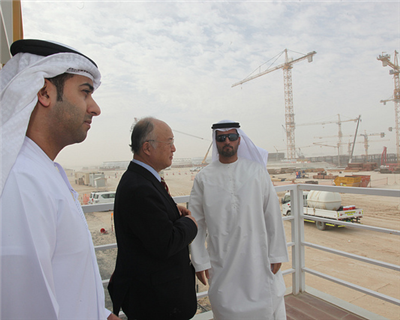UAE secures $24.4bn for its first nuclear power plant
Kexim will provide a $2.5 billion direct loan to a Korean Electric Power Corporation (Kepco)-led consortium to fund the construction of four 1,400 MW nuclear reactors at the UAE's Barakah nuclear power plant.

Kexim will provide a $2.5 billion direct loan to a Korean Electric Power Corporation (Kepco)-led consortium to fund the construction of four 1,400 MW nuclear reactors at the UAE's Barakah nuclear power plant.
The United Arab Emirates (UAE) has secured $24.4 billion in funding for the first nuclear power plant in the country. The Department of Finance of Abu Dhabi and the Export-Import Bank of Korea (Kexim) have stumped up the lion’s share of the financing thus far.
A Korea Electric Power Corporation (Kepco)-led consortium will build four 1,400 megawatt (MW) nuclear reactors at the Barakah plant to meet the UAE's surging demand for electricity. Emirates Nuclear Energy Corp (ENEC) and Kepco jointly own the project.
"It is the first nuclear power project in the Middle East, excluding Iran," a Dubai-based export financier involved in the project’s financing tells TXF.
The financing comprises direct loans of $19.6 billion, with $16.2 billion from the Abu Dhabi government and another $2.5 billion from Kexim.
Kexim's tied financing benefits from a 21-year tenor with an 18-year repayment period post construction, in accordance with the OECD guideline for nuclear projects.
Some 20% of the total project cost is coming from equity commitments from ENEC (82%) and Kepco (18%), totalling $4.7 billion – signed in Abu Dhabi on 20 October 2016.
The Department of Finance of Abu Dhabi is funding 70% of the project, and the remaining 10% is coming from foreign lenders, much of which by Kexim.
A $250 million commercial tranche is being provided by the National Bank of Abu Dhabi, First Gulf Bank, HSBC and Standard Chartered. HSBC acted as financial adviser on the deal.
The Dubai-based export financier says:"Kexim required the presence of commercial banks next to them to lend as part of its policy. Usually when ECAs lend they prefer having uncovered commercial lenders sharing the risk of the project alongside them."
The debt is fully guaranteed by the Department of Finance. Traditionally for nuclear projects a pure project finance structure with limited recourse to sponsors is not possible because of the construction and operational risks considered.
For example, French nuclear company Areva's recent reactor-building experiences in Finland and France are experiencing up to 10 years of delays. "This illustrates the need for strong guarantees on the debt," says the export financier.
Construction on the Barakah plant has already progressed significantly with the UAE's first reactor being 90% complete, although the project has been far from smooth sailing.
Debt discussions started in 2009 and were meant to reach financial close in 2012, and then in 2014, but both deadlines were missed for various reasons, says the source.
Originally, the Export-Import Bank of the United States of America (US Ex-Im) was involved in the deal, but the US agency stopped its $2 billion direct loan after certain modifications were made to the finance documents that it refused to accept.
UAE diversifies energy strategies
Electricity demand among UAE households has been growing significantly in the past few years and will be difficult to manage in the future if no effective sustainable measures are undertaken, a study by London-based management consultancy Strategy& has revealed.
Energy consumption in the UAE has been growing at an annual rate of 4% over the past six years and analysts predict that the growth rate will increase to 5% through to 2020.
The need for implementing measures to address growing energy consumption levels has been highlighted by rapid urbanisation and population growth in UAE.
The study showed that electricity consumption alone has more than doubled in the past 10 years, "at a pace that will be difficult to provide for over the long term, " says the study.
According to estimates, the UAE's gross domestic electricity consumption will reach 141 terawatt-hours in 2020, up from 103 terawatt-hours in 2014.
"The question for the UAE is the value of oil for making electricity to meet domestic markets versus exporting oil," Charles Forsberg, a professor specialising in nuclear power at Massachusetts Institute of Technology, tells TXF. "Nobody builds oil power plants, why should the UEA?"
"If the UEA expects future oil prices to go down much further is that the logical choice – in which case the entire Persian Gulf sees economic collapse followed by political unrest."
Forsberg says: "The nuclear build is clearly to diversify energy strategies away from fossil fuels, or in their case oil."
The other factor to consider is the increasing international constraints on greenhouse gas emissions in a country with a very considerable carbon footprint associated with its oil industry.
"The UAE has seen the handwriting on the wall,” says Forsberg. “Nuclear is the economic baseload option if one does not want large greenhouse gas releases.” Air conditioning contributes to almost 70% of Abu Dhabi's electricity consumption.
“Thanks to the local climate, these guys have a serious air conditioning load 24 hours per day, and therefore have a serious need for baseload electricity." Forsberg concludes.
Meet top borrowers, exporters, traders and corporate treasurers at TXF Middle East 2016! For trade, commodity, export & project finance professionals...

.jpg)




